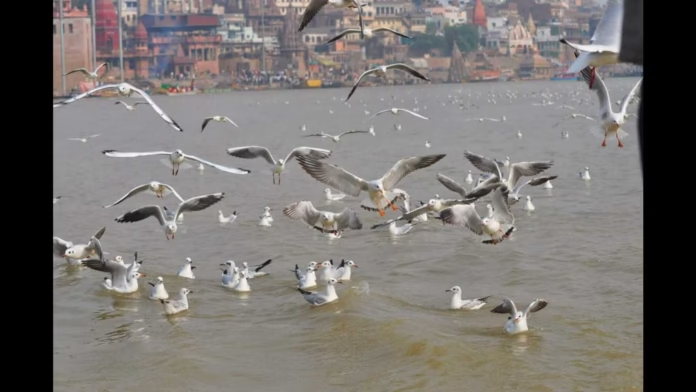Written by Were Kelly
The iconic ghats of Varanasi are playing host to an unexpected early arrival of guests this winter, as thousands of migratory birds from Siberia have begun flocking to the banks of the Ganga, weeks ahead of their usual schedule.
The spectacle of Siberian cranes and ruddy shelducks dotting the riverfront has delighted tourists and provided a welcome economic boost for local boatmen and vendors, even as it signals broader environmental shifts.
The birds, which travel thousands of miles from their Arctic breeding grounds, are a familiar sight in Varanasi between December and March.
This year, however, their arrival in large numbers by mid-November has caught the attention of both enthusiasts and scientists.
The birds can be seen foraging and resting at the Dashashwamedh Ghat and other locations, with boatmen offering them a local snack called ‘sev’, much to the amusement of visitors. The avian visitors are expected to stay in the region for the next four months.
For the local economy, which is heavily reliant on tourism, the early arrival is a boon. “The early birds are a blessing,” said Rajesh Sahni, a boatman for over twenty years.
“More tourists mean more boat rides, and we love feeding them ‘sev’. It brings joy to everyone.” However, experts from Banaras Hindu University sound a note of caution. Ornithologist Professor A. Gupta noted, “While a delightful sight, the early migration is a climate signal. Warmer winters in Siberia are allowing for an earlier departure. We must also intensify conservation efforts as the Ganga’s pollution threatens their habitat and health.”
The broader context of this phenomenon connects local ecology to global climate patterns. The birds undertake one of the longest known migrations, flying up to 200 miles a day to escape the harsh Siberian winter.
Their altered schedule is a visible indicator of a warming planet. While the scene provides a picturesque enhancement to Varanasi’s spiritual allure and supports a winter tourism industry worth an estimated £100 million, it is shadowed by the ongoing challenge of cleaning the Ganga. Conservationists warn that without a healthier river ecosystem, the annual migration that draws so many visitors could itself be at risk in the long term.
Sources: Hindustan Times, ETV Bharat.



















